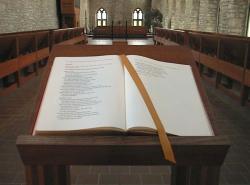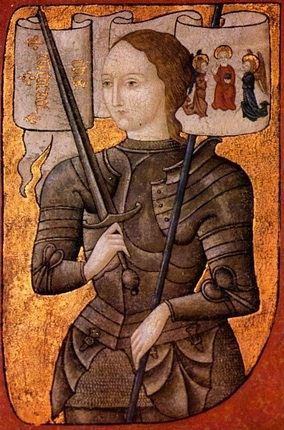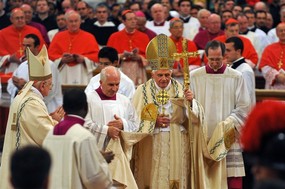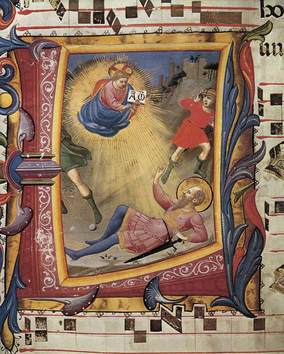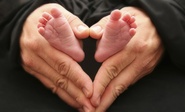The Word of God is everything: hearing what the WORD has to say
I am reading Verbum Domini with great eagerness. I am talking my reading seriously and trying to ponder what the Pope has given us as a path to Christ and to live as an authentic Christian today. Let’s recall the extraordinary address of Pope Benedict XVI on October 6, 2008 where he said:
“the Word of God is the foundation of everything, it is the true reality. And to be realistic, we must rely upon this reality. We must change our idea that matter, solid things, things we can touch, are the more solid, the more certain reality. At the end of the Sermon on the Mount the Lord speaks to us about the two possible foundations for building the house of one’s life: sand and rock. The one who builds on sand builds only on visible and tangible things, on success, on career, on money. Apparently these are the true realities. But all this one day will pass away. We can see this now with the fall of large banks: this money disappears, it is nothing. And thus all things, which seem to be the true realities we can count on, are only realities of a secondary order. The one who builds his life on these realities, on matter, on success, on appearances, builds upon sand. Only the Word of God is the foundation of all reality, it is as stable as the heavens and more than the heavens, it is reality. Therefore, we must change our concept of realism. The realist is the one who recognizes the Word of God, in this apparently weak reality, as the foundation of all things. Realist is the one who builds his life on this foundation, which is permanent.”
Scott W. Hahn, Covenant and Communion (2009), p. 22.
In another place we read:
You cannot put revelation in your pocket like a book you carry around with you. It is a living reality that requires a living person as the locus of its presence.
That is, the believer becomes real insofar as he becomes the Word by hearing such that he does it. That seems to be the only reality that perdures. Revelation is an act in which God shows Himself. Faith is a corresponding act of hearing and doing the Word heard. Outside of that, everything else perishes into nothingness.
J. Ratzinger, God Word: Scripture – Tradtion – Office, Ignatius (2008): 52.
New York Encounter 2011: a review
Last weekend the New York Encounter was “a success” for the second year in a row. Lots of people, friends and guests came together for a public meeting to hear presentations, to engage in discussion, to share friendly meals and to be caught up in beautiful music. Several significant speakers addressed the crowds. People like Cardinal Seán O’Malley, OFM Cap., Father Julián Carrón, Msgr. Lorenzo Albacete, John Garvey, Carla Hendra, Charles, Townes, Clara Gaymard and others.
Formerly ex-communicated saints
Saint Joan of Arc
Saint Joan of Arc is a confusing figure for some these days. I think she’s abused by the feminists who dash-off with her story for their own agenda which runs contrary to the authentic Christian woman, Joan. If you miss the fact of Joan’s rootedness in Christ and the Church, then you miss the point of her life and work. The synthesis of the Pope’s teaching is given here. The full texts follows below.
Our catechesis
today deals with Saint Joan of Arc, one of the outstanding women of the later
Middle Ages. Raised in a religious family, Joan enjoyed mystical experiences
from an early age. At a time of crisis in the Church and of war in her native
France, she felt God’s call to a life of prayer and virginity, and to personal
engagement in the liberation of her compatriots. At the age of seventeen, Joan
began her mission among the French military forces; she sought to negotiate a
just Christian peace between the English and French, took an active part in the
siege of Orleans and witnessed the coronation of Charles VII at Rheims.
Captured by her enemies the next year, she was tried by an ecclesiastical court
and burnt at the stake as a heretic; she died invoking the name of Jesus. Her
unjust condemnation was overturned twenty-five years later. At the heart of
Saint Joan’s spirituality was an unfailing love for Christ and, in Christ, for
the Church and for her neighbour. May the prayers and example of Saint Joan of
Arc inspire many lay men and women to devote themselves to public life in the
service of God’s Kingdom, and encourage all of us to live to the fullest our
lofty calling in Christ.
Christianity is not a community closed-in on itself, Pope tells us about Unity among Christians
The Pope’s homily for Vespers at the Basilica of Saint Paul’s Outside the Walls for the feast of the Conversion of Saint Paul and the closing of Week of Prayer for Christian Unity. A video clip of the event.
Following the
example of Jesus, who on the eve of his Passion prayed to the Father for his
disciples “that they may all be one” (John 17:21), Christians
continue to invoke incessantly from God the gift of this unity. This request is
made more intense during the Week of Prayer, which ends today, when the
Churches and ecclesial Communities meditate and pray together for the unity of
all Christians.
This year the theme offered for our meditation was proposed by
the Christian communities of Jerusalem, to which I would like to express by heartfelt
gratitude, accompanied by the assurance of affection and prayer either on my
part or on that of the whole of the Church. The Christians of the Holy City
invite us to renew and
Opportunities for continuing dialogue with the Orthodox Church, Farrell says
In the middle of
the annual exercise of prayer and
study for Christian Unity, the Vatican’s daily news paper, L’Osservatore Romano,
interviewed Bishop Brian Farrell, LC, secretary of the Pontifical Council for
Promoting Christian Unity. The interviewer asked Bishop Farrell about problems
in the ecumenical quest with the Orthodox Church, and his answer is below.
We
are examining the crucial point of our differences on the Church’s structure
and way of being and operating: the question of the role of the Bishop of Rome
in the Church communion of the first millennium, when the Church in the West
and East was still united. After profound studies and discussions, the members
of the Theological Commission have come to realize the enormous difference
between the lived, assimilated, and narrated historical experience in Western
culture and the historical experience perceived in the Eastern vision of
things. Every historical event is open to different interpretations. The
discussion has not led to a real convergence.
Continue reading Opportunities for continuing dialogue with the Orthodox Church, Farrell says
Conversion of Saint Paul
In Paul what is pointed out theologically was also brought about physically: healed of his inner blindness, he sees clearly. Thus St Paul was not transformed by a thought but by an event, by the irresistible presence of the Risen One whom subsequently he would never be able to doubt, so powerful had been the evidence of the event, of this encounter. It radically changed Paul’s life in a fundamental way; in this sense one can and must speak of a conversion. This encounter is the centre St Luke’s account for which it is very probable that he used an account that may well have originated in the community of Damascus.
Tips for growing in holiness and going to Mass
In a previous blog post on the Father David Toups,
pastor of a Florida parish the author drew our attention to a young but
accomplished priest who was doing his best to live the vocation he was given.
As a secular priest he’s pastoring souls to Jesus by encouraging them to lead
lives of holiness. And remember, holiness is not reserved to a few; it is
however, open and “achievable” by all. So the question becomes: How do I work
on becoming holy?
Continue reading Tips for growing in holiness and going to Mass
March 4 Life
“An estimated 2
billion human beings have died through abortion in the last forty years alone.
This is something most people don’t realise and it needs to be emphasized,” says Joseph Meaney, Director of International Coordination at Human Life
International. In addition, Meaney pointed out: “its becoming increasingly
clear that the vast majority of Americans are against abortion on demand, and
over the years more pro-life justices have been appointed to the Court, but yet
the law itself and the court’s decision has not changed. The result is a
growing frustration among Americans that the will of the people is not being
respected.”
Today tens of thousands of people will march on Washington DC, to
mark this weekend’s anniversary of the 1973 Roe v. Wade Supreme Court decision
that legalized abortion in the United States. Yesterday, Cardinal Daniel N. DiNardo, Archbishop of Galveston-Houston, celebrated Mass for thousands in DC. Since 1973, more than 50 million
babies have been aborted, and 300K women developed breast cancer as a result of
having an abortion.

